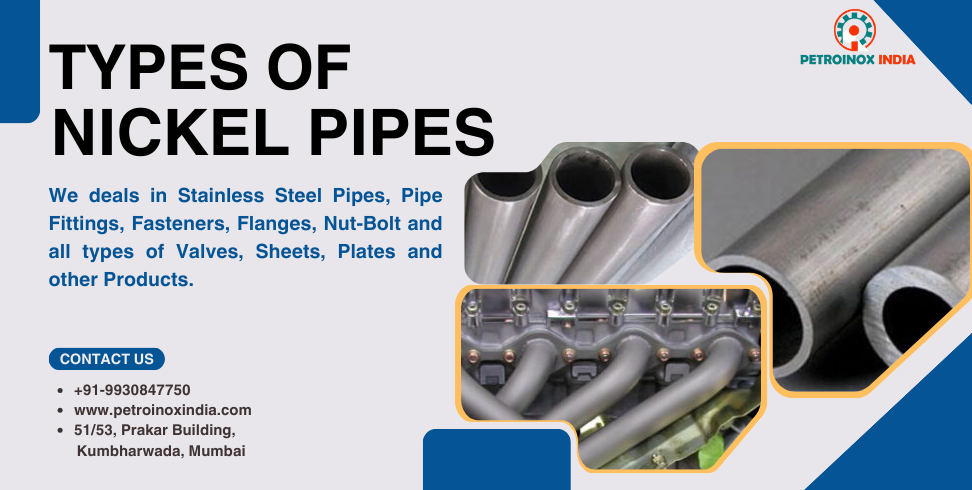Nickel pipes are a critical material in many industries, valued for their exceptional properties such as corrosion resistance, high strength, and excellent thermal and electrical conductivity. These characteristics make nickel pipes indispensable in various applications ranging from chemical processing and aerospace to energy production and marine environments. This article delves into the properties of nickel pipes, their manufacturing process, and their versatile applications across industries.
Properties of Nickel Pipes
Nickel is a versatile metal with a unique combination of properties, making it highly suitable for use in demanding environments. The primary attributes of nickel pipes include:
- Corrosion Resistance: Nickel exhibits outstanding resistance to corrosion and oxidation, even in extreme environments such as acidic and alkaline solutions, seawater, and high-temperature settings. This makes nickel pipes ideal for use in chemical processing and marine applications.
- Thermal and Electrical Conductivity: Nickel has excellent thermal and electrical conductivity, making it suitable for heat exchangers, electrical systems, and other high-performance applications.
- Strength and Ductility: Nickel pipes offer high mechanical strength while retaining ductility, allowing them to withstand mechanical stress and deformation in various applications.
- Compatibility with Alloys: Nickel can be alloyed with other metals like chromium, molybdenum, and iron to enhance its properties further. Nickel alloys, such as Inconel and Monel, are widely used in industries requiring superior strength and resistance to harsh environments.
- High Temperature Resistance: Nickel pipes maintain their mechanical properties at elevated temperatures, making them essential in power generation and aerospace engineering applications.
Manufacturing of Nickel Pipes
The production of nickel pipes involves several stages to ensure the final product meets stringent industry standards:
- Raw Material Preparation: Nickel ore is extracted, refined, and processed into pure nickel or nickel alloys. This raw material forms the basis of high-quality nickel pipes.
- Forming and Extrusion: The nickel or nickel alloy is heated and shaped into the desired pipe form through processes such as extrusion, where the metal is forced through a die to create a hollow tube.
- Welding and Seamless Production: Nickel pipes can be produced as either seamless or welded. Seamless pipes are made from solid billets and offer uniform strength and corrosion resistance, while welded pipes are formed by welding sheets or strips of nickel.
- Heat Treatment: To enhance mechanical properties and relieve stress, nickel pipes undergo heat treatment processes like annealing.
- Quality Control and Testing: The final pipes are subjected to rigorous quality checks, including non-destructive testing (NDT), to ensure they meet industry standards for safety and performance.
Applications of Nickel Pipes in Various Industries
The unique properties of nickel pipes make them a cornerstone of modern industry. Below are some of the key sectors where nickel pipes play a pivotal role:
- Chemical and Petrochemical Industry
- Nickel pipes are extensively used in chemical processing plants due to their resistance to highly corrosive chemicals such as acids, alkalis, and salts.
- They are employed in reactors, heat exchangers, and storage tanks that handle aggressive substances.
- Nickel alloys, such as Hastelloy, are particularly popular in environments requiring enhanced resistance to stress corrosion cracking.
- Energy Production
- In power plants, nickel pipes are used in steam turbines, heat exchangers, and boiler systems where high temperature and pressure are prevalent.
- The renewable energy sector also utilizes nickel pipes in geothermal energy systems and solar power plants, leveraging their durability and thermal efficiency.
- Aerospace Industry
- Nickel pipes are integral to aerospace engineering, particularly in jet engines, where they are exposed to high temperatures and mechanical stress.
- Their lightweight strength and ability to withstand thermal cycling make them essential for fuel and hydraulic systems.
- Marine Industry
- In marine environments, where exposure to saltwater can cause severe corrosion, nickel pipes are the material of choice for piping systems, desalination plants, and offshore oil platforms.
- Monel, a nickel-copper alloy, is widely used in marine applications for its superior corrosion resistance.
- Food and Beverage Industry
- Nickel pipes are used in the production and transportation of food and beverages due to their resistance to contamination and ease of cleaning.
- They comply with strict sanitary standards, ensuring that the products remain safe for consumption.
- Pharmaceutical and Healthcare Sector
- In the pharmaceutical industry, nickel pipes are used for transporting chemicals and manufacturing medicines. Their non-reactive nature ensures purity in drug production.
- Healthcare facilities employ nickel pipes in medical devices and sterilization equipment.
- Automotive Industry
- Nickel pipes are used in exhaust systems, fuel lines, and catalytic converters due to their ability to withstand high temperatures and corrosive gases.
- Electric vehicles benefit from nickel-based components in battery systems, enhancing energy efficiency and longevity.
Advantages of Using Nickel Pipes
- Longevity: Nickel pipes offer an extended lifespan, reducing the need for frequent replacements and maintenance.
- Efficiency: Their high thermal conductivity and resistance to fouling improve the efficiency of heat exchangers and other systems.
- Versatility: Nickel pipes are available in various sizes, grades, and configurations, allowing customization for specific applications.
- Sustainability: Nickel is recyclable, making it an environmentally friendly choice for industries aiming to reduce their carbon footprint.
Challenges and Considerations
While nickel pipes offer numerous benefits, there are challenges to consider:
- Cost: Nickel and its alloys are relatively expensive compared to other materials, which can increase the overall project cost.
- Fabrication Difficulty: The hardness of nickel can make it challenging to machine and fabricate, requiring specialized equipment and expertise.
- Supply Chain Dependency: The availability of nickel is subject to global mining and refining operations, which can affect supply and pricing.
Conclusion
Nickel pipes are a vital component in many industries, offering unparalleled performance in demanding environments. Their combination of corrosion resistance, high strength, and thermal conductivity ensures their widespread use in sectors ranging from chemical processing and aerospace to energy production and healthcare. Despite challenges such as cost and fabrication complexity, the long-term benefits of using nickel pipes often outweigh these concerns.
As industries continue to innovate and push the boundaries of technology, the demand for nickel pipes is expected to grow. Investing in high-quality nickel pipes and leveraging their unique properties can significantly enhance the efficiency, safety, and longevity of industrial systems. For manufacturers and engineers, understanding the advantages and applications of nickel pipes is essential to making informed decisions in design and material selection.



 Pipes
Pipes